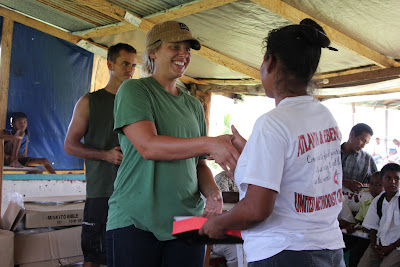


To say the least, these past two days have been incredible! We left the town of Puerto Cabezas for the village of Dakura on Wednesday morning by boat. There were many firsts for all of us within these last few days so I’ll list them quickly and go on to focus on a couple key events of this part of our trip. We rode to Dakura in 20 foot motorboats through 4 foot waves and stinging rain (I was told not to worry if the boat flipped, because sharks didn’t come that close to shore. Google said otherwise) for about an hour and a half. After that we had a hike through a washed out trail and knee high water up to our destination of Dakura. Living here for two days gave us an eye opening first hand experience of true community and allowed us to escape many superfluous first world expectations including running water, flushing toilets, toilets in any real sense, bathing, general hiegene, wearing shoes, electricity, and wifi. Living with and in the same conditions as those in a disconnected indigenous village in a third world country is really the only way to have an understanding of the thousands of things we as wealthy (comparatively) Americans take for granted.
Dakura, Nicaragua is made up of almost 500 indigenous Miskito people, of about 80,000 Miskito spread out through Nicaragua and Honduras. There are 48 families in the village which means each family has about 8 children! We discovered that this village is so disconnected from the rest of Nicaragua and general outside contact that none of the children spoke or understand one word of Spanish, and the only adults who really speak Spanish are fishermen who sail out to sea to work on larger boats for weeks at a time to bring back a catch to feed their families. Often, when there is a storm and no way of catching fish, these people go without eating. For the vast majority, fishing is the only occupation. As we observed from the stilted houses often built out of scrap wood and aluminum sheeting, the hurricanes (like hurricane Felix 3 years ago) that come through every few years off of the carribean wipe this area of nearly everything taller than a blade of grass, leaving these people with almost no traceable physical history.
The main purpose of our coming to this area specifically was to deliver bibles written in Miskito which have previously been unavailable even to the pastors in this community. We were well aware beforehand that being able to read the Word of God in one’s native language allows for people to connect on a much greater level than they ever would reading it in a second language to which they did not relate or even just hearing the words of a preacher claiming that what he said was God’s word. We were not prepared for the response we received when the people of this village learned we were delivering Bibles that they could actually read. If we tried to hand out free Bibles in San Bernardino we would probably have to resort to bribing people to get rid of any. Here, as soon as word spread that we were bringing Bibles, there were families coming from all over the village to get their own Bible. One woman walked 5 miles to receive the last Bible we had brought. This, in addition to all the time we spent with the kids playing games, doing crafts, telling Bible stories, and having a huge spaghetti dinner with all of our neighbors made us wish we could spend more time in this beautiful area.
Thank you from the people of Dakura to all those who bought Bibles at CBC and supported us delivering them!
By: Daniel Pryde

No comments:
Post a Comment